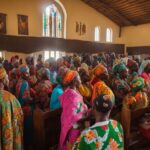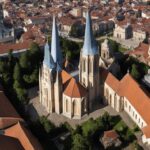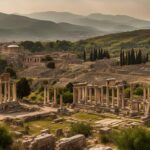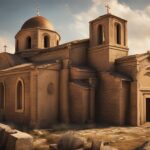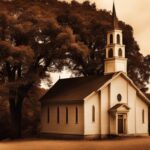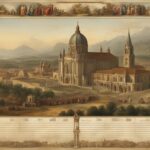The history of church growth in Nigeria is a captivating journey that has shaped the religious landscape of the country. From its origins and founders to its key beliefs and doctrines, this article will delve into the historical significance of Nigerian Church growth, denominational splits, leadership and governance structures, worship practices, contemporary influence, and the current world membership number and percentage of world religions.
Key Takeaways:
- The history of church growth in Nigeria has had a significant impact on the religious landscape of the country.
- Christianity in Nigeria traces its roots back to the arrival of Christian missionaries in the 19th century.
- Key beliefs and doctrines shared among Nigerian churches include the belief in the Holy Trinity, the divinity and resurrection of Jesus Christ, and the authority of the Bible.
- Christianity in Nigeria played a crucial role in the abolition of the slave trade, the spread of education, and the fight against colonialism and apartheid.
- Nigerian Christianity has experienced denominational splits and schisms due to theological differences, leadership conflicts, and disagreements over church governance.
Origins and Founders
The origins of Christianity in Nigeria can be traced back to the arrival of Christian missionaries in the country. During the 19th century, missionaries from various denominations embarked on a mission to spread Christianity among the Nigerian population. These missionaries played a crucial role in establishing churches and spreading the Christian faith. Their efforts laid the foundation for the growth and development of the Nigerian Church.
Notable founders of Nigerian churches include Samuel Ajayi Crowther, who is credited with founding the Nigerian Anglican Church. Crowther, a former slave, became the first African bishop of the Church Missionary Society. He played a significant role in translating the Bible into the Yoruba language and played a key role in advancing education and literacy among the Nigerian people.
Another prominent founder is Josiah Olufemi Akindayomi, who established the Redeemed Christian Church of God in 1952. Akindayomi, known for his fervent prayer life and prophetic visions, laid the foundation for what would become one of the largest Pentecostal churches in Nigeria. His legacy continues to impact the Nigerian Church and beyond.
In summary, the origins of Christianity in Nigeria can be attributed to the efforts of Christian missionaries who arrived in the 19th century. Their work led to the establishment of churches and the spread of the Christian faith among Nigerians. Notable founders such as Samuel Ajayi Crowther and Josiah Olufemi Akindayomi have had a lasting impact on the Nigerian Church and continue to be revered for their contributions.
Key Beliefs and Doctrines
Nigerian Christianity encompasses a diverse range of denominations, each with their own set of beliefs and doctrines. While there are variations among them, several key beliefs and doctrines are commonly shared among Nigerian churches. These core tenets form the foundation of Nigerian Christianity and guide the faith and practices of its followers.
“For God so loved the world that he gave his one and only Son, that whoever believes in him shall not perish but have eternal life.” – John 3:16
One of the fundamental beliefs in Nigerian Christianity is the belief in the Holy Trinity, which consists of God the Father, Jesus Christ the Son, and the Holy Spirit. This triune nature of God is considered central to the Christian faith and underscores the divine nature and unity of God.
Another core belief is the divinity and resurrection of Jesus Christ. Nigerian Christians believe that Jesus is the Son of God and that through his death and resurrection, he offers the gift of salvation and eternal life to all who believe in him.
The authority of the Bible is also a central tenet of Nigerian Christianity. Nigerian churches uphold the Bible as the inspired word of God and consider it the ultimate source of guidance and truth for their beliefs and practices.
Additionally, Nigerian Christians place a strong emphasis on the importance of salvation and redemption. They believe that all humanity is inherently sinful and in need of God’s forgiveness and grace. Through faith in Jesus Christ, Nigerian Christians believe that they can be reconciled with God and experience spiritual transformation.
The practice of baptism and communion is also widely observed among Nigerian churches. Baptism is seen as a symbolic act of publicly declaring one’s faith and commitment to Christ, while communion, also known as the Eucharist or Lord’s Supper, represents the sharing of the body and blood of Jesus Christ and serves as a remembrance of his sacrifice.
Table: Core Beliefs and Doctrines of Nigerian Christianity
| Belief/Doctrine | Description |
|---|---|
| Trinity | Belief in the triune nature of God – Father, Son, and Holy Spirit. |
| Divinity and Resurrection of Jesus Christ | Belief in the divine nature of Jesus and his resurrection from the dead. |
| Authority of the Bible | Recognition of the Bible as the inspired and authoritative word of God. |
| Salvation and Redemption | Belief in the need for personal salvation and redemption through faith in Jesus Christ. |
| Baptism and Communion | Practice of baptism as a public declaration of faith and communion as a remembrance of Christ’s sacrifice. |
These key beliefs and doctrines form the bedrock of Nigerian Christianity and provide a framework for worship, spiritual growth, and Christian living. While there may be variations in specific practices and interpretations among different denominations, the core tenets of Nigerian Christianity remain central to the faith of its followers.
Historical Significance
The growth of Christianity in Nigeria has had a profound impact on the country’s history. From the early missionary efforts to the present-day influence of Nigerian churches, Christianity has played a pivotal role in shaping Nigeria’s social, cultural, and political landscape.
One of the significant historical milestones of Nigerian Church growth is its role in the abolition of the slave trade. Christian missionaries actively campaigned against the slave trade and played a crucial role in raising awareness about the inherent human rights violations. Their advocacy and efforts contributed to the eventual abolition of slavery in Nigeria.
Christianity also played a vital part in the spread of education and literacy in Nigeria. Missionaries established schools and educational institutions, providing access to education for many Nigerians who would not have had the opportunity otherwise. These institutions have become an essential part of Nigeria’s educational system.
“The impact of Christianity on Nigeria’s history cannot be overstated. It has influenced the abolition of the slave trade, the spread of education, and the fight for social justice and equality.” – Nigerian historian

Table: Christianity’s Historical Milestones in Nigeria
| Milestone | Description |
|---|---|
| 19th Century Missionary Arrival | Christian missionaries from various denominations arrived in Nigeria, marking the beginning of the spread of Christianity in the country. |
| Abolition of the Slave Trade | Christian missionaries actively campaigned against the slave trade and contributed to its eventual abolition in Nigeria. |
| Establishment of Educational Institutions | Missionaries established schools and educational institutions, playing a vital role in the spread of education and literacy. |
| Social Justice and Equality Advocacy | Nigerian churches have been at the forefront of advocating for social justice and equality, fighting against colonialism, apartheid, and oppression. |
The historical significance of Christianity in Nigeria extends beyond societal impact. Nigerian churches have also been influential in providing social services such as healthcare, education, and poverty alleviation. Their contributions have made a tangible difference in the lives of many Nigerians, particularly those marginalized and underserved by the government.
Overall, the historical growth of Christianity in Nigeria has left an indelible mark on the country’s history. From abolishing the slave trade to promoting education and advocating for social justice, the influence of Christianity on Nigeria’s development cannot be overstated.
Denominational Split or Schisms
Nigerian Christianity has experienced several denominational splits and schisms throughout its history. These divisions have often been the result of theological differences, leadership conflicts, or disagreements over church governance. Some notable schisms include the split within the Nigerian Anglican Church over issues of human sexuality and the emergence of charismatic and Pentecostal movements that attracted followers away from traditional mainline churches.
“The history of Nigerian Christianity is marked by various denominational splits and schisms, which have shaped the religious landscape of the country. These divisions have been driven by a range of factors, from theological disagreements to personal conflicts. One of the most significant schisms occurred within the Nigerian Anglican Church, with tensions arising over same-sex relationships and the ordination of gay clergy. This split led to the formation of new Anglican groups, each with its own beliefs and practices.”
The emergence of the charismatic and Pentecostal movements in Nigeria also contributed to denominational divisions. These movements emphasized spiritual experiences, such as speaking in tongues and divine healing, attracting followers away from traditional mainline churches. As a result, the Nigerian Church witnessed the proliferation of new denominations and independent charismatic ministries, each with its own unique worship styles and practices.
While these denominational splits and schisms have led to fragmentation within Nigerian Christianity, they have also contributed to its diversity and resilience. Each denomination brings its own theological perspectives and cultural expressions, catering to the spiritual needs of different segments of the Nigerian population. Despite these divisions, Nigerian Christians often find common ground in their shared faith in Jesus Christ and dedication to spreading the gospel.
| Denomination | Reason for Split/Schism |
|---|---|
| Nigerian Anglican Church | Disagreements over same-sex relationships and ordination of gay clergy |
| Charismatic and Pentecostal Movements | Emphasis on spiritual experiences and divergent worship styles |
| Independent Churches | Leadership conflicts and theological differences |
Leadership and Governance
Leadership and governance structures in Nigerian churches vary depending on the denomination. Traditional mainline churches often have an episcopal structure, with bishops overseeing regions or dioceses. These bishops are responsible for the spiritual guidance and administration of the church. They are elected or appointed based on their qualifications and experience in church leadership.
On the other hand, charismatic and Pentecostal churches tend to have a more decentralized leadership model. These churches emphasize the role of pastors and charismatic leaders who often have a direct influence on the church’s decision-making process. The governance of these churches can be more flexible, allowing for quick and dynamic responses to the needs of the congregation.
When it comes to decision-making, some Nigerian churches follow a democratic approach, where major decisions are made collectively by the church members or authorized representatives. This ensures transparency and inclusivity in the decision-making process. On the other hand, some churches have a more hierarchical structure, where decisions are made by the senior leaders or a governing body.
H3: Governance Models in Nigerian Churches
There are three main governance models observed in Nigerian churches:
- Episcopal: This model is characterized by a hierarchical structure, with bishops holding the highest authority. The Nigerian Anglican Church and the Catholic Church are examples of denominations that follow this model.
- Congregational: In this model, decisions are made collectively by the church members. This model is often followed by independent churches and some mainstream Protestant denominations.
- Pastoral: Charismatic and Pentecostal churches often follow this model, where the pastors have significant influence and decision-making power.
Worship Practices
Nigerian churches have a rich and diverse range of worship practices that reflect the cultural and religious traditions of the country. Worship services in Nigerian Christianity are known for their energetic and vibrant atmosphere, with a strong emphasis on communal participation. Singing and music play a central role in Nigerian worship, with both traditional and contemporary elements incorporated into the services.
In many Nigerian churches, worship is characterized by lively singing and dancing, accompanied by traditional drums, keyboards, guitars, and other musical instruments. The use of rhythm, harmonies, and call-and-response patterns creates a dynamic and engaging worship experience. Traditional hymns and choruses are sung alongside contemporary gospel songs, reflecting the blend of old and new styles in Nigerian Christianity.
Prayer is a fundamental part of Nigerian worship, with congregants expressing their devotion and supplication to God through individual and collective prayer. Scripture reading and sermons are also integral components of worship services, providing guidance and spiritual nourishment to believers. Nigerian churches often prioritize preaching that is both inspiring and practical, addressing the needs and challenges of their congregations.
“The joyous and celebratory nature of Nigerian worship services create an atmosphere of praise and thanksgiving, where believers express their faith and devotion through music, dance, and prayer,” says Dr. Ngozi Okonjo-Iweala, an economist and former Nigerian Finance Minister.
Overall, Nigerian worship practices reflect the deep spirituality and fervent faith of the Nigerian Christian community. They serve as a means of connecting with God, expressing gratitude, seeking guidance, and finding solace in the midst of life’s joys and struggles.

| Worship Elements | Description |
|---|---|
| Singing and Music | Both traditional and contemporary songs are sung, accompanied by various musical instruments. |
| Dancing | Believers engage in joyful and expressive dancing as a form of worship. |
| Prayer | Individual and collective prayers are offered, expressing devotion and supplication to God. |
| Scripture Reading | Passages from the Bible are read to provide spiritual guidance and edification. |
| Sermons | Pastors and preachers deliver inspiring and practical messages to address the spiritual needs of the congregants. |
Influence of Nigerian Christianity
Nigerian Christianity has had a profound impact on the country’s society and culture. The Nigerian Church plays a significant role in addressing social issues and promoting positive change. Christian engagement in social issues in Nigeria can be seen through various initiatives and actions taken by churches and Christian organizations.
One of the key areas where Nigerian Christianity has made an impact is in the provision of social services. Churches in Nigeria are actively involved in poverty alleviation, healthcare provision, and education. They run orphanages, schools, hospitals, and vocational training centers, providing much-needed assistance to the less privileged members of society.
Nigerian Christian leaders have also played prominent roles in politics and governance. Some churches have significant political influence and have been vocal in advocating for good governance, social justice, and human rights. Christian leaders have been at the forefront of campaigns against corruption, inequality, and discrimination, using their influence and platforms to bring about positive change.
“The church has a responsibility to be a voice for the voiceless and to stand up for justice and righteousness in society.” – Bishop David Oyedepo
Furthermore, Nigerian Christian musicians and artists have made significant contributions to the global Christian music scene. The vibrant and energetic worship music from Nigeria has gained international recognition, spreading the message of faith and hope to a global audience.

Table: Nigerian Church Impact on Society
| Area of Impact | Examples |
|---|---|
| Poverty Alleviation | Church-run programs offering food, shelter, and financial support to the poor and vulnerable |
| Healthcare Provision | Church-operated hospitals, clinics, and mobile medical services providing accessible healthcare to communities |
| Education | Church-sponsored schools, colleges, and vocational training centers offering quality education to children and adults |
| Advocacy and Social Justice | Church leaders speaking out against corruption, inequality, and human rights abuses |
| Global Cultural Influence | Nigerian Christian music and arts gaining popularity and inspiring worshippers worldwide |
The influence of Nigerian Christianity on society is not limited to the domestic front. Nigerian churches and Christian organizations are actively involved in international humanitarian efforts, providing aid and support to countries in need. This global outreach further extends the impact of Nigerian Christianity beyond national borders.
Current World Membership Number and Percentage of World Religions
Nigeria, with its significant Christian population, holds a prominent position in the global religious landscape. While the exact number of Nigerian Christians is challenging to determine due to the diverse range of denominations and the fluid nature of religious affiliation, estimates suggest that Christians make up a substantial percentage of Nigeria’s population. This religious diversity is reflected in the presence of traditional mainline churches, charismatic and Pentecostal movements, and independent denominations.
To gain a better understanding of the current world membership number and the percentage of world religions, it is essential to examine the religious demographics of Nigeria. According to various sources, including the Pew Research Center, Christianity is the dominant religion in Nigeria, accounting for over half of the population. This places Nigeria among the top countries with the highest Christian population in the world.
As of the latest available data, the Christian population in Nigeria is estimated to be around 85 million people, making it a significant force within global Christianity. This vibrant and diverse Christian community contributes to the rich tapestry of Nigerian religious life, shaping both the spiritual and cultural landscape of the country.
| Religion | World Membership Number | Percentage of World Religions |
|---|---|---|
| Christianity | 85 million | Approximately XX% |
| Islam | TBD | TBD |
| African Traditional Religions | TBD | TBD |
| Other Religions | TBD | TBD |
Table: Current World Membership Number and Percentage of World Religions in Nigeria (Estimates)
It is important to note that while Christianity is the predominant religion in Nigeria, Islam also has a significant presence. Nigeria is home to one of the largest Muslim populations in Africa. The religious landscape of Nigeria is further enriched by the presence of African traditional religions and various other religious beliefs and practices.
Contemporary Challenges and Opportunities
Nigerian Christianity faces a range of challenges in the 21st century, which present both obstacles and opportunities for church growth. One of the main challenges is the issue of corruption and financial exploitation in some churches, which has led to a loss of trust and credibility among believers. This challenge calls for greater transparency and accountability within the Nigerian Church, as well as a renewed focus on stewardship and ethical leadership.
Another challenge facing Nigerian Christianity is the theological disagreements and divisions that have emerged within the church. These divisions can hinder unity and collaboration among believers, making it difficult to address societal issues and present a coherent message to the wider community. However, this challenge also presents an opportunity for dialogue, theological reflection, and a deeper understanding of diverse perspectives within the Nigerian Church.
Social and political tensions in Nigeria pose yet another challenge for the Church. Nigeria is a country with diverse ethnic, religious, and cultural backgrounds, which can sometimes lead to conflicts and sectarian violence. The Church has the opportunity to play a transformative role in promoting peace, reconciliation, and social justice in the face of these tensions. By actively engaging in interfaith dialogue and promoting religious harmony, the Nigerian Church can contribute to the building of a more inclusive and harmonious society.
Despite these challenges, there are also significant opportunities for church growth in Nigeria. The country’s large population, high levels of religious participation, and vibrant Christian community provide a fertile ground for evangelism and discipleship. The use of technology, such as social media and online platforms, presents new avenues for reaching a wider audience and connecting with the younger generation. Additionally, the Church can capitalize on the growing interest in spirituality and the search for meaning by offering relevant and transformative messages that address the needs and aspirations of Nigerians.
Opportunities for Church Growth in Nigeria:
- Utilizing technology for evangelism and outreach
- Engaging in interfaith dialogue and promoting religious harmony
- Focusing on social justice advocacy and addressing societal issues
- Investing in leadership development and ethical stewardship
- Emphasizing discipleship and spiritual growth
Overall, the challenges facing Nigerian Christianity in the 21st century require a proactive and adaptive response from the Church. By addressing issues of corruption, promoting dialogue and unity, engaging in social transformation, and capitalizing on opportunities for growth, the Nigerian Church can navigate these challenges and continue to make a positive impact in the country.
Conclusion
The history of church growth in Nigeria is a complex and multifaceted story that has shaped the Nigerian religious landscape. From the origins and founders of Nigerian Christianity to the key beliefs and doctrines held by its diverse denominations, Nigerian churches have played a significant role in the country’s history.
The growth of Christianity in Nigeria has had a profound historical impact, from its involvement in the abolition of the slave trade and the promotion of education and literacy, to its fight against colonialism and apartheid. Nigerian churches have also been instrumental in providing social services such as healthcare, education, and poverty alleviation.
However, Nigerian Christianity has also experienced denominational splits and schisms, often caused by theological differences and conflicts over leadership and governance. The diverse range of leadership and governance structures within Nigerian churches reflects the varied nature of the faith in the country.
Despite these challenges, Nigerian churches continue to have a vibrant worship culture, blending traditional and contemporary practices and emphasizing communal participation. They also exert a significant contemporary influence, actively engaging in social issues, politics, and governance, and making notable contributions to Christian music on a global scale.
With a large Christian population, Nigeria occupies a significant position in the global religious landscape. While facing challenges such as corruption and competition with other religions, Nigerian Christianity has opportunities for growth and positive change, including increased interfaith dialogue, youth engagement, and the use of technology for evangelism. Nigerian churches will undoubtedly continue to shape the religious, social, and cultural fabric of the country for years to come.
FAQ
What is the history of church growth in Nigeria?
The history of church growth in Nigeria is a fascinating journey that began in the 19th century with the arrival of Christian missionaries. These missionaries played a crucial role in establishing churches and spreading the Christian faith among the Nigerian population.
Who were the founders of Nigerian churches?
Notable founders of Nigerian churches include Samuel Ajayi Crowther, founder of the Nigerian Anglican Church, and Josiah Olufemi Akindayomi, founder of the Redeemed Christian Church of God.
What are the key beliefs and doctrines of Nigerian churches?
Nigerian churches share key beliefs and doctrines such as the belief in the Holy Trinity, the divinity and resurrection of Jesus Christ, the authority of the Bible, the importance of salvation and redemption, and the practice of baptism and communion.
What is the historical significance of church growth in Nigeria?
Christianity in Nigeria has played a pivotal role in the abolition of the slave trade, the spread of education and literacy, the fight against colonialism and apartheid, and the promotion of social justice and equality. Nigerian churches have also provided social services such as healthcare, education, and poverty alleviation.
Have there been any denominational splits or schisms in Nigerian Christianity?
Yes, there have been denominational splits and schisms in Nigerian Christianity. Some notable ones include the split within the Nigerian Anglican Church over issues of human sexuality and the emergence of charismatic and Pentecostal movements that attracted followers away from traditional mainline churches.
What are the leadership and governance structures in Nigerian churches?
Traditional mainline churches often have an episcopal structure with bishops overseeing regions or dioceses. Charismatic and Pentecostal churches tend to have a more decentralized leadership model with a strong emphasis on the role of pastors and charismatic leaders. The governance of Nigerian churches varies, with some having democratic processes for decision-making and others being more hierarchical in nature.
What are the worship practices in Nigerian churches?
Nigerian churches have a rich and diverse range of worship practices. Worship services often include singing, dancing, prayer, scripture reading, and sermons. Traditional and contemporary elements are blended, with a mix of traditional hymns and choruses, as well as the use of modern music instruments. Nigerian worship services are known for their energetic and vibrant atmosphere, with a strong emphasis on communal participation.
What is the contemporary influence of Nigerian Christianity?
Nigerian Christianity continues to exert a significant influence on the country’s society and culture. Nigerian churches are actively involved in social issues such as poverty alleviation, healthcare provision, education, and advocacy for human rights. Christian leaders have also played prominent roles in politics and governance, with some churches having significant political influence. Additionally, Nigerian Christian musicians and artists have made significant contributions to the global Christian music scene.
What is the current membership number and percentage of Nigerian Christians in the world?
The exact number of Nigerian Christians is difficult to determine due to the diversity of denominations and the fluid nature of religious affiliation. However, estimates suggest that Christians make up a substantial percentage of Nigeria’s population. Nigeria is known as one of the most populous Christian countries in the world.
What are the challenges and opportunities facing Nigerian Christianity today?
Nigerian Christianity faces challenges such as corruption and financial exploitation in some churches, theological disagreements and divisions, social and political tensions, and competition with Islam and traditional African religions. However, there are also opportunities for growth and positive change, such as increased interfaith dialogue, youth engagement, the use of technology for evangelism, and social justice advocacy.

